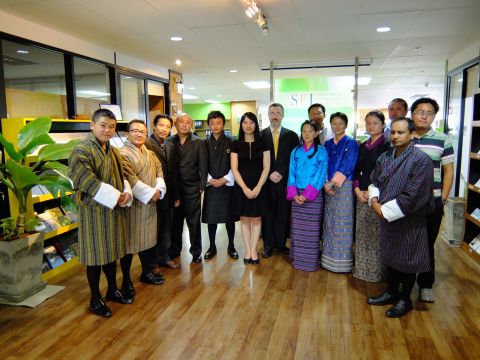Capacity-building on Climate Change Adaptation and Mitigation for District and National Environmental Officers of Bhutan

- Level: Introductory
- Time commitment: 5 days
- Learning product: Workshop/event series
- Sector: Multi-sector
- Location: Bhutan
- Language: English
- Certificate available: No

Participants and trainers in the workshop for the National Environment Commission officers of Bhutan
Summary
The Stockholm Environment Institute conducted a customised 5-day interactive workshop on climate change adaptation and mitigation in Bangkok, Thailand on 23-27 February 2015 for district and national officers of Bhutan’s National Environmental Commission. The objective of this workshop was to impart foundational knowledge, and generate insights and skills on climate change science, models, adaptation and mitigation among the participants.
The workshop intended to provide the participants with a deeper understanding on the nature of climate science and climate models and how they might be applicable to mountain environments such as Bhutan. The workshop also helped identify the impacts of climate change in Bhutan, the different sources of vulnerabilities and the options that might be explored to address them. Finally, participants also learned about new technologies and tools to respond to and prepare for the impacts of climate change, and to develop networks to share and access climate change information.
Day 1 – Climate science introduction
The workshop started with an introduction to climate science and modelling on Day 1. This session provided a general overview of the climate systems, and climate change. This was followed by a session on climatic risk and vulnerability. The objective was to improve the participants’ understanding of risk and vulnerability and highlight some approaches to address them, including disaster risk reduction (DRR) and climate change adaptation (CCA).
Day 2 – Climate change vulnerability
On Day 2, the workshop focused on the social and human issues that underpin climate change vulnerability. This was followed by a session on climate change and water in mountainous environments. This session introduced basic hydrology, the hydrological cycle as well as the climate, bio-physical, human and water management characteristics of mountainous environments and the potential impacts of climate change.
Day 3 – Field visit on water management infrastructure
A field visit to Rama VI Dam in Ayuthaya Province was organized on Day 3 to expose participants to water management infrastructure and approaches in Thailand, where they gained an increased understanding about how local communities were affected by the flooding in 2011 and how they coped.
Day 4 – Water resource planning, climate change adaptation and mitigation
On Day 4, participants were introduced to tools and technologies for water resources planning and climate change adaptation that could be applied in Bhutan. Main tools that were discussed involved Integrated Water Resource Management (IWRM), Decision Support Tools (DST), Geographical Information System (GIS), Hydrological Modelling, Climate Change Models, and Water Evaluation and Planning System (WEAP). This was followed by a session on challenges in climate change mitigation. The session provided an overview of the trends in global greenhouse gas (GHG) emissions and its impacts in the world’s climate.
Day 5 – Case study application and weADAPT training
On the final Day 5, an activity based on Action Learning Set (ALS) on environment and climate change was conducted so that the participants can use the insights gained from the workshop to look at real life environmental and climate change issues in Bhutan. The participants were also given a quick lecture on how to communicate for influence and a tour on how to use weADAPT to look for and share information on climate change adaptation.
- Stockholm Environment Institute Asia Centre
- National Environmental Commission of the Royal Government of Bhutan
- Access Bhutan Training Workshop Program
Contact: For more information about the workshop and other professional development workshops, please contact Dr. Albert Salamanca at [email protected]
(0) Comments
There is no content